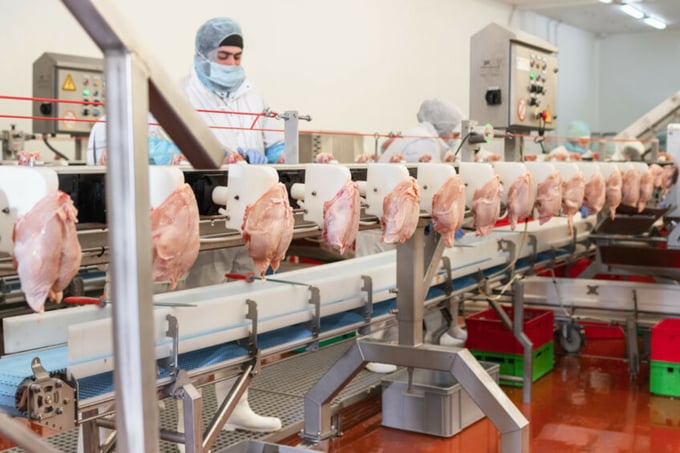May 21, 2025 | 09:08 GMT +7
May 21, 2025 | 09:08 GMT +7
Hotline: 0913.378.918
May 21, 2025 | 09:08 GMT +7
Hotline: 0913.378.918

It is reported that without illegal workers, US poultry processing companies will have to raise wages to attract American workers and/or further automate. Photo: Canva.
According to Wired Magazine, “around 23% of workers in the meatpacking industry are undocumented and 42% are foreign-born.”
As noted recently by a city council member in Fremont, Nebraska, named Paul von Behren, “the primary draw [for hiring illegal workers] is the cheap labour they provide. They’re basically less educated and less skilled than the average American worker. We’re primarily a meat processing town, so by and large our businesses like to have them here.”
It is difficult to find Americans to take on processing jobs at present wages due to the physically-taxing and potentially dangerous nature of the work during shifts of 8 hours or more in cold temperatures.
Still, as noted by many new articles, including one in the media outlet Stateline, “if President-elect Donald Trump follows through on his pledge to deport millions of immigrants, it could upend the economies of states where farming and other food-related industries are crucial.”
Labour shortages already widespread
In poultry processing, pig farming, dairy farming and many other ag-related contexts, labour shortages are already common in the US and other countries. Indeed, the shortages in poultry processing are severe. About 58% of these workers quit their jobs within 90 days and another 28% quit between 90 days and 180 days.
Automation firm Meyn reports that “absenteeism and high turnover are estimated to add 4% to processing costs. And at the same time the poultry business is growing rapidly due to increasing worldwide demand for protein and the success of poultry as a protein source.”
Higher costs coming
Without illegal workers, US poultry processing companies will have to raise wages to attract American workers and/or further automate. Many options for automating exist in each part of the handling, slaughter and meat processing operation. There is also the option to rapidly legalise many thousands of sector workers.
Regarding the challenges ahead, Wired Magazine reports that during a recent Tyson Foods earnings call, CEO Donnie King was calm. “There’s a lot that we don’t know at this point,” he stated to shareholders, “but I would remind you that we’ve successfully operated this business for over 90 years, no matter the party in control.”
(PW)

(VAN) Attempts to bring down the price of the Japanese staple have had little effect amid a cost-of-living crisis.

(VAN) Fourth most important food crop in peril as Latin America and Caribbean suffer from slow-onset climate disaster.

(VAN) Shifting market dynamics and the noise around new legislation has propelled Trouw Nutrition’s research around early life nutrition in poultry. Today, it continues to be a key area of research.

(VAN) India is concerned about its food security and the livelihoods of its farmers if more US food imports are allowed.

(VAN) FAO's Director-General emphasises the need to work together to transform agrifood systems.

(VAN) Europe is facing its worst outbreak of foot-and-mouth since the start of the century.

(VAN) The central authorities, in early April, released a 10-year plan for rural vitalization.